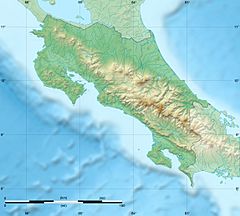Isthmohyla xanthosticta facts for kids
Quick facts for kids Isthmohyla xanthosticta |
|
|---|---|
| Conservation status | |
| Scientific classification |
|
| Kingdom: | Animalia |
| Phylum: | Chordata |
| Class: | Amphibia |
| Order: | Anura |
| Family: | Hylidae |
| Genus: | Isthmohyla |
| Species: |
I. xanthosticta
|
| Binomial name | |
| Isthmohyla xanthosticta (Duellman, 1968)
|
|
| Script error: The function "autoWithCaption" does not exist. | |
| Synonyms | |
|
Hyla xanthosticta Duellman, 1968 |
|
Script error: No such module "Check for conflicting parameters".
The Isthmohyla xanthosticta is a special kind of frog that belongs to the Hylidae family, also known as treefrogs. This amazing frog is found only in Costa Rica, which means it's endemic there. It's mostly known from one specific place: the south side of Barva Volcano in the Heredia Province. People sometimes call it the south fork treefrog.
Contents
Discovering the South Fork Treefrog
Scientists first learned about the Isthmohyla xanthosticta from studying a few frogs. The main frog they studied, called a holotype, was an adult female. This female frog was about 29 mm (1.1 in) long from its snout (nose) to its vent (tail end). That's about the size of a large paperclip!
What Does It Look Like?
This frog's head is as wide as its body. It has a snout that's not too long and looks a bit flat at the end. The frog has a clear tympanum, which is like its eardrum. However, a fold of skin above it partly covers it.
Its front legs are not too long and are quite thin. Its fingers have large, round pads at the ends, which help it stick to surfaces. About a quarter of its fingers are connected by webbing. The back legs are also not too long and are slender. Its toes are about two-thirds webbed and have pads that are a little smaller than those on its fingers.
Frog Colors
The Isthmohyla xanthosticta is a beautiful frog! Its back is a solid green color. But its sides and thighs (the upper part of its back legs) are brown with large, bright yellow spots. It also has a wide, bronze-tan stripe that runs from its eye towards its snout. The frog's throat and belly are a pale yellow color.
Where Does It Live?
The first Isthmohyla xanthosticta frog found was living in a lower montane rainforest. This means it was in a forest on the lower part of a mountain. It was found at about 2,100 m (6,900 ft) above sea level. The frog was sitting on a leaf, about 1 meter (3 feet) above the ground.
Protecting Its Home
The place where this frog was found is inside the Braulio Carrillo National Park. This park is a protected area, which means the frog's home is kept safe and natural. The forest here is very clean and untouched.
However, even in protected areas, there can be threats to animals. For the Isthmohyla xanthosticta, possible dangers include:
- Chytridiomycosis: This is a serious disease that affects amphibians like frogs.
- Climate change: Changes in the Earth's weather patterns can affect the frog's habitat.
- Airborne pollution: Pollution carried by the wind can also harm the frog and its environment.
Scientists and park rangers work hard to protect this special frog and its rainforest home.
See also
 In Spanish: Isthmohyla xanthosticta para niños
In Spanish: Isthmohyla xanthosticta para niños
 | Kyle Baker |
 | Joseph Yoakum |
 | Laura Wheeler Waring |
 | Henry Ossawa Tanner |



